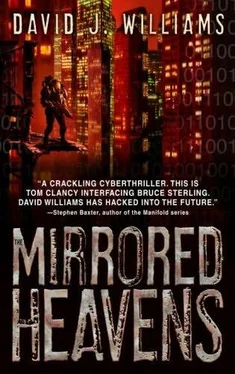She gets it.
Even as they almost get her. They spot her for real. She doesn’t know how. Maybe it was some random check. Maybe it was their sudden shift to full war footing. Maybe they’ve been stalking her the whole time. It doesn’t matter. What matters is the long, scaled tongue that suddenly flicks toward her from out of the inky depths. She dodges. It misses. She retracts. It comes after her. She takes evasive action, takes herself in among all that data, does her best to blend in. All she needs is a moment. But it needs far less than that to nail her. It sails in toward her. She sees it as it really is: a grinning cat-skull that’s nothing but jaws enclosing her. She scatters herself into pieces, confuses it for a moment. But not nearly long enough. It looms before her eyes. She meets its eyes.
But suddenly it’s reeling. It flails. She flails with it. What else can she do? This net is under attack. It’s being pummeled. It’s cauterizing whole sections of itself in the name of survival. Whole portions of existence are getting sheared off. The links to all those cities disappear. They’re gone. The lines through which she’s racing are buckling. Yet all the while the scattered fragments of her body are converging upon the light. She sees it now: the square that denotes transition. The door to salvation. The way out. She sails toward it. And still that tongue follows her. It reaches for her heart. It winds about her leg. She dissolves that leg. She raises her arms. She shouts.
And jacks out.
Smoke is streaming in front of her eyes. Sparks are coming off the cluster of screens. The room’s shaking—just as she’s being shaken by Morat. He pulls the jacks straight off her. Pieces of her skin go with them. She blinks. She bleeds. She looks at him. He looks at her. Smoke pours between them.
“We have to leave right now,” he says quietly.
“No shit,” she says.
That’s when soldiers on thrusters land amidst them, haul them out of the room without a ceiling, over the maze that’s not a maze, back out into the warehouse. Back out to the elevator. The room’s on fire. Smoke’s pouring down the catwalks. Noise is everywhere. The soldiers cluster around them.
Morat turns to one. “Lieutenant—what’s the status outside?”
“They’re attacking in strength all along the perimeter, sir.”
“How close are they to this building?”
“Sir, we think they’re inside, sir.”
“You think so?”
“We’ve lost contact with everybody beneath level forty.”
Morat shoves Haskell forward, sending her stumbling toward the lieutenant.
“Take the razor,” he says. “Save the razor. Take her up the shaft right now. Do it yourself. What’s left of your platoon can get in there and be the shields. I don’t care who gets hit. I don’t care who dies. Just save the fucking razor . Get her out of here. Assume this hedgehog’s getting overrun. Assume we’re fucked. Do you understand me? ”
“Yes, sir,” replies the lieutenant. “What about you?”
“Leave one squad with me. We’ll dismantle this equipment and follow you.”
“Sir: if they’re inside the building, you won’t make it.”
“Don’t tell me what I will or won’t make,” says Morat. “Just go.”
They’re going. And Haskell knows why he’s staying. To gather the equipment—or make sure it’s properly destroyed. So he won’t have to tell Matthew Sinclair that he let the Jaguars root through everything CICom knows about their net. The soldiers are blasting the elevator doors down, adding to the smoke inside the room. They don’t take Morat’s instructions literally, though. The lieutenant’s got the most guns. So he hands her to one of the sergeants. Soldiers scramble into the elevator, ignite their thrusters. Some go up the shaft, some go down. The elevator car’s well below them. They rain explosives down upon it, send it crashing down for good. The sergeant grabs Haskell with both arms—“Sorry about this, ma’am,” she says, and steps forward, leaps. Haskell feels the heat of the jets on her face. She’s being hauled upward. Floors whiz past. Cables streak by. All of it’s wreathed in flame and shadow. Haskell feels the distance between her and sky narrowing.
Something slams against her. She hears an explosion. She hears a scream. She feels something wet hit her face. She feels her escort’s grip loosening. She tumbles from that dead grasp. She starts to fall down the shaft.
Something grabs her. “Got ya”—and she’s pressed into his arms: “for fuck’s sake protect her head,” someone shouts, and someone else is screaming that the Jags are in the shaft, and she finds herself thinking it must have been a trap after all. But she’s just clinging on to this arm, on to both arms, and her face is pressed up against the side of the soldier’s visor, and through it she can see distorted eyes peering intently past her at what’s reflected in that same visor: the ceiling shooting down toward her like she’s in a needle and it’s the plunger—and then the soldiers open fire and blast it away and they all blast straight through onto the roof.
Which is a shambles. As is everything beyond it. Buildings are burning, collapsing. Beams from heaven stab here and there, shimmer in the fog. The thunder of detonations rolls across the city. Belem-Macapa’s entered a new stage of its agony. The soldiers on the roof are firing in all directions. Haskell’s escorts shove her through a jet-copter’s open hatch. They’re screaming at the pilot to gun it. He needs no such urging: the ’copter rises. Haskell’s being strapped in by its gunner. She’s about to pull on her breath-mask: but now the doors slide shut and the craft switches over to its own recycled air as its motors switch into overdrive. She’s watching the rooftop fall away. Everything turns to cloud.
Suddenly there’s another explosion, and way too close—the rumbling of the engines shreds away into a high-pitched whining. The ’copter staggers. For a moment, it continues on its course.
But only for a moment.
“What the fuck’s happening?” yells the gunner.
“We’re going to crash,” the pilot says matter-of-factly.
The gunner’s lost it. He’s screaming. But Haskell’s saying nothing. She’s just lying back as the craft plummets downward. The plummet’s not total. The pilot’s still got some kind of control. But only just. They churn through smog. Buildings whip by. She hears the gunner praying. She hears the pilot cursing. He’s working the controls with more than just his hands—twisting his whole body this way and that, as though he could pull the craft out of its descent through sheer muscle. But to no avail. They scream in above a rooftop, just miss a pylon. She catches a glimpse of water. She catches a glimpse of ships. She thinks she must be dreaming. She braces herself.
They hit.

Marlowe can’t do anything but keep moving. His camos are turned up to the full. He’s stealing through the city like a wraith. He’s staying indoors whenever he can—hurtling down corridors, rising up shafts. He leaves his thrusters offline whenever he’s outside. He doesn’t want to make himself any more of a target than he already is. All he wants to do is get out of here.
Which is going to be tough. He’s glad his suit still has atmosphere despite the battering it’s taken. Because oxygen’s become a major factor. As has heat. The temperature’s at least twenty degrees warmer than when he made his entrance. It’s not hard to understand why. The flames off to the south are as tall as the buildings around which they lick. Their light brings a new kind of shadow to this dark. He’s intent on getting as far away from it as possible.
Читать дальше













